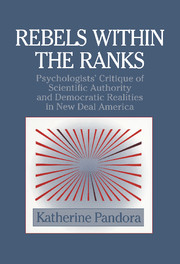 Rebels within the Ranks
Rebels within the Ranks Book contents
- Frontmatter
- Contents
- Acknowledgments
- Introduction
- 1 The Deep Context of Dissent: Jamesian Philosophy and Social Gospel Theology
- 2 Challenging the Rules of the Game
- 3 Defying the Law of Averages: Constructing a Science of Individuality
- 4 The Pursuit of “Impure” Science: Constructing a Science of Social Life
- 5 Natural History and Psychological Habitats
- 6 Exploratory Relativism and Patterns of Possibility
- Conclusions
- Notes
- Index
Conclusions
Published online by Cambridge University Press: 06 October 2009
- Frontmatter
- Contents
- Acknowledgments
- Introduction
- 1 The Deep Context of Dissent: Jamesian Philosophy and Social Gospel Theology
- 2 Challenging the Rules of the Game
- 3 Defying the Law of Averages: Constructing a Science of Individuality
- 4 The Pursuit of “Impure” Science: Constructing a Science of Social Life
- 5 Natural History and Psychological Habitats
- 6 Exploratory Relativism and Patterns of Possibility
- Conclusions
- Notes
- Index
Summary
The world is full of partial stories that run parallel to one another, beginning and ending at odd times. They mutually interlace and interfere at points, but we can not unify them completely in our minds.
William James (1907)How to confront the complexity of the natural and the social worlds was one of the most highly charged questions that the generation of Allport and the Murphys faced during the 1930s. Many of their colleagues sought to manage this complexity by reducing the subject matter they studied to the simplest terms possible, whether by searching for clues to the nature of human life in the behavior of rats or pigeons or microscopic worms, or by restricting the form of scientific questions to those that could be answered in the language of statistical regularity. But others, Allport and the Murphys among them, argued for the intellectual, moral, and political benefits of working one's way through complexity, rather than seeking to make it disappear.
As their efforts took shape over the course of the 1930s, these three psychologists produced a diverse body of work from within social and personality psychology that challenged dimensions of scientific life that the discipline's arbiters were striving to present as matters of settled fact. When Lois Barclay Murphy labeled her own work an “exploratory study,” or Allport declared that an aspect of his research represented “a declaration of independence,” or Gardner Murphy spoke of the need to “shut our eyes and jump as far as the structure of the human mind permits,” they were each making plain that they considered the rules of the game to be open to challenge.
- Type
- Chapter
- Information
- Rebels within the RanksPsychologists' Critique of Scientific Authority and Democratic Realities in New Deal America, pp. 177 - 182Publisher: Cambridge University PressPrint publication year: 1997


